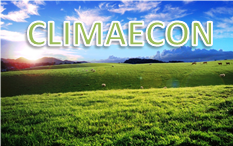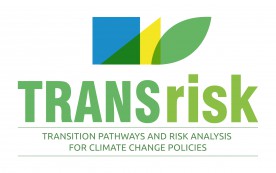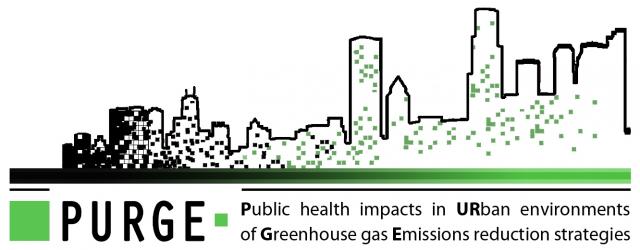- Home
- Completed projects
Completed projects
COACCH
|
CO-designing the Assessment of Climate CHange costs |
||
|
COACCH will develop an innovative science-practice and integrated approach to co-design and co-deliver an improved downscaled assessment of the risks and costs of climate change in Europe, working with end users from research, business, investment, and policy making communities throughout the project. COACCH will advance the evidence base on complex climate change impact chains, assessing their market, non-market, macroeconomic and social consequences in the EU. |
||
CLIMAECON
Políticas climáticas y transición a una economía baja en carbono |
 |
|
|
El principal objetivo de este proyecto de investigación es contribuir al avance del conocimiento científico para promover la reducción de emisiones de carbono y favorecer la transición a una economía baja en carbono. Este proyecto está orientado, específicamente, a adquirir nuevos conocimientos que permitan avanzar en la resolución del Reto 5 ("Acción sobre el cambio climático y eficiencia en la utilización de recursos y materias primas") identificado en la Estrategia Española de Ciencia y Tecnología y de Innovación. |
||
TRANSRISK
| Transitions pathways and risk analysis for climate change mitigation and adaption strategies |  |
|
|
The main aims and objectives of TRANSrisk project are: To create a novel assessment framework for analysing costs and benefits of transition pathways, where uncertainty is at the heart of policy design rather than accounted for through sensitivity analysis at the end of the analysis. The innovative framework will integrate well-established approaches to modelling the costs of resilient, low-carbon pathways with a wider interdisciplinary approach including risk assessments. Designing a decision support tool for policymakers. A decision support tool should help policy makers to better understand uncertainties and risks and enable them to include risk assessments into more robust policy design. |
||
COMPLEX
| Knowledge Based Climate Mitigation Systems for a Low Carbon Economy |  |
|
|
The science of complex systems distinguishes linear from non-linear dynamics. Simpler systems can often be satisfactory described by linear models, but complex systems require non-linear models that can capture more of the characteristics of such systems, such as thresholds, feedback loops, avalanche effects, and irreversibility. Linear systems can be validated by aligning models to the past and using the model to predict the future. Non-linear systems, however, are often time-asymmetric - they can be explained with the wisdom of hindsight, but are not always predictable. For example, systems may respond sharply to minor perturbations, and the quality of this response is a measure of the system resilience. In practice, non-linear dynamics are significant both at the micro-scale of small history and at the macro-scale of deep time. The brilliant young scientist, for example, may experience a series of epiphanies that change his/her understanding and behaviour in an unpredictable and irreversible way. The scientific community as a whole may experience an innovation-cascade that has a similar effect on a much larger scale.
|
||
PAEE
| Politicas de Apoyo a la eficiencia enérgetica: impuestos vs subvenciones | ||
|
El objetivo principal de este proyecto se centra en la comprensión de los factores que explican las pautas de consumo desde la óptica de mejorar las políticas para la promoción de hábitos de consumo más sostenible y bajos en carbono; con una atención especial a las políticas de promoción de la eficiencia energética en el consumo residencial. Para ello se procederá a analizar las siguientes cuestiones: el papel de las eco-etiquetas en las decisiones del consumidor, el sobreprecio que actualmente se paga en el mercado por bienes ambientalmente superiores y la sensibilidad (elasticidad precio de la demanda) de sustitutivos cercanos ambientalmente superiores y bajos en carbono. Toda esta información nutrirá el análisis de los instrumentos de política diseñados para favorecer cambios en las pautas de consumo hacia hábitos más sostenibles. En este contexto se analizarán nuevos instrumentos de política de acuerdo a las lecciones aprendidas a lo largo del proyecto. El esfuerzo se centrara en uno de los tres grupos de bienes que representan gran parte de la huella ecológica y de carbono en el consumo residencial: los electrodomésticos; como indicadores del consumo de energía en el hogar. |
||
COBELOC
| Consumer Behaviour for a Low Carbon Economy | ||
|
Como objetivo central del proyecto, BC3 se está centrando en comprender los factores que impulsan los patrones de consumo. Lo que se busca es mejorar las políticas diseñadas y puestas en práctica para promover patrones de consumo más sostenibles y bajos en carbono. BC3 se está centrando especialmente en políticas diseñadas para mejorar la eficiencia energética en los hogares. |
||
FLAGSHIP
| Forward Looking Analysis of Grand Societal cHallenges and Innovative Policies |  |
|
|
FLAGSHIP is an FP7 project, funded by the European Commission (DG RESEARCH) under the “Socio-Economic Sciences and Humanities” theme, with the aim of developing a “Forward Looking Analysis of Grand Societal Challenges and Innovative Policies”. The FLAGSHIP project thus aims at driving change, supporting the policy shift from adapting to changes through short-term policy responses, towards anticipating, welcoming and managing changes properly.
|
||
PURGE
| Public health impacts in URban environments of Greenhouse gas Emissions reduction strategies |  |
|
|
The project will examine the health impacts of greenhouse gas (GHG) reduction policies in urban settings inEurope, China and India, using case studies of 3-4 large urban centres and three smaller urban centres. Sets of realistic interventions will be proposed, tailored to local needs, to meet published abatement goals for GHG Emissions for 2020, 2030 and 2050. Mitigation actions will be defined in four main sectors: power generation/industry, household energy, transport and food and agriculture. The chief pathways by which such measures influence health will be described, and models developed to quantify changes in health-related ‘exposures’ and health behaviours. Models will include ones relating to outdoor air pollution, indoor air quality and temperature, physical activity, dietary intake, road injury risks and selected other exposures.
|
||
CECILIA 2050
| Choosing Efficient Combinations of Policy Instruments for Low-carbon development and Innovation to Achieve Europe's 2050 climate targets |  |
|
|
The EU wants to transform itself to a low-carbon economy by mid-century. This transformation process will require an overhaul of the European economy, affecting a range of sectors – not only power generation, industry and transport, but also agriculture, construction or finance. Governing this transformation process is a huge challenge – stimulating the necessary innovations, ensuring public support, encouraging the needed investments, creating the right infrastructure, and avoiding lock-in into old, carbon-intensive technologies.
To manage this transformation, a range of policy instruments is required. The existing mix of climate policy instruments needs to be scaled up drastically to initiate the necessary changes. But as the scale and scope of instruments increases, it becomes more important to understand and to manage their interaction, as do constraints on the political, legal and administrative feasibility. Policy solutions that have worked well in an economic niche are not necessarily suited to guide economic development on a broad scale; instruments that have co-existed well on a small scale may conflict when scaled up to an economywide level. To evaluate their efficiency and effectiveness, policy instruments cannot be viewed in isolation; understanding and managing their interaction becomes key. |
||
|
|
||
|
|
||
DECCMA
|
DEltas, vulnerability and Climate Change; Migration as an Adaptation |
 |
|
|
With their large and often poor populations in low-lying areas, deltas have long been seen as highly vulnerable to climate change and non-climate drivers with, in the most extreme, large-scale displacement of people being the result. Migration is a complex process which is already occurring in all deltas, largely independent of climate change. Most research on deltas and migration tends to focus on individual system elements and issues rather than taking a systems-level perspective. This fails to consider the wider consequences of climate change and the interdependence between these phenomena and people’s behaviour. In contrast to previous research, this programme of research will take a systemic and multi-scale analytical perspective to understand gendered vulnerability and adaptation in deltas under a changing climate by analysing four contrasting populous delta systems in South Asia and Africa where there is significant potential for migration. |
||

